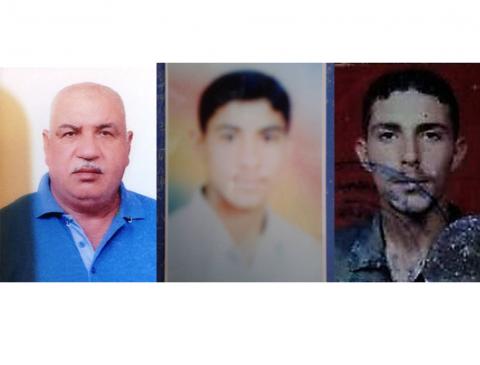
On April 23 and 24, 2018, Alkarama and Al Wissam Humanitarian Assembly requested the urgent intervention of the UN human rights mechanisms in the cases of three individuals who disappeared following their arrests by the Iraqi authorities between 2006 and 2015.
The organisations requested that the UN Committee on Enforced Disappearances (CED) and the UN Working Group on Enforced or Involuntary Disappearances (WGEID) intervene with the Iraqi authorities to ensure that Azoz Al Bazi, Abdel Razzak Al Abbasi, and Ibrahim Al Shammari are released immediately or, at the very least, that their fates and whereabouts are disclosed to their families.
Three cases of enforced disappearances between 2006 and 2015
On June 28, 2006, Ibrahim Al Shammari was arrested at his home in Baghdad by a group of five militiamen who physically assaulted him before forcing him into a pickup truck. Later that day, he was taken to the Sharoufi mosque in Baghdad where other detainees were also being held. US forces raided the mosque later that night, and apprehended all the detainees before taking them to an unknown location.
Since the date of his arrest, Al Shammari has appeared twice on Iraqi television. The first time was in 2009, when member of parliament Hareth Al Obaidi visited a prison where Al Shammari was detained, and the second in February 2010 when Tarik Al Hashimi, the former vice-president, visited a detention facility in Baghdad to which he had been transferred.
Al Shammari’s family lodged a complaint with the Adhamiyah police station in 2007, and also enquired about his fate and whereabouts at the Ministry of Human Rights, the Tasferat prison in Al Rusafa, Baghdad, and the 5th division of the Iraqi Federal police, all to no avail.
Eight years later, on August 5, 2014, while on their way home to Samarra, Abdel Razzak Al Abbasi and his cousin, Mohamad, were arrested at a checkpoint under the control of Saraya al-Salam militia in Al-Hauesh, in the Diyala Governorate of Iraq. Saraya al-Salam is a militia that is considered part of the Popular Mobilisation Units (PMU), an umbrella organisation of militias which was incorporated into the Iraqi armed forces on December 19, 2016, and included in the country’s security forces on March 8, 2018.
The family submitted a complaint to the court in Samarra one week after Al Abbasi’s arrest, and enquired about his whereabouts in other prisons, but could not locate his name in any of the prisons' registries. Three months later, Mohamad was released, but Abdel Razek Al Abbasi’s family has not heard from him since the date of his arrest.
In January 2016, former detainees of Naseriyah prison informed Al Abbasi’s family that he was being detained at the prison, and that a large number of detainees’ names were not registered in the prison’s registry. However, the family decided not to enquire about Al Abbasi’s fate at Naseriyah prison out of fear of being arrested. The family had previously received text messages threatening to burn down the family’s house, behead Al Abbasi, and abduct his children. The court in Samarra was unable to carry out an investigation into the threats received by the family because the messages were sent by unregistered numbers which could not be identified.
In a similar case, Azoz Al Bazi disappeared after being arrested by officers of the Iraqi military forces on March 11, 2015 at his home in Samarra, Iraq. After raiding the house and confiscating electronic devices, the officers arrested Al Bazi without presenting a warrant, and took him to an unknown location, threatening his family not to follow them. Al Bazi was last seen by a former detainee at Muthanna Airport prison in December 2016.
Since his disappearance, Al Bazi’s family have submitted complaints to the Iraqi Central Criminal Court, and searched his name in the Muthanna Airport prison’s registry, their last enquiry taking place on April 5, 2018. However, they have received no information on his fate and whereabouts to date.
Cases submitted to UN human rights mechanisms
Alkarama and Al Wissam Humanitarian Assembly requested that the CED intervene with the Iraqi authorities in the cases of Azoz Al Bazi and Abdel Al Abbasi to ensure their immediate release or, at the very least, that they are put under the protection of the law and their families are informed of their fates and whereabouts.
The CED is responsible for monitoring State Parties’ implementation of the International Convention for the Protection of All Persons from Enforced Disappearance (ICPPED). As Ibrahim Al Shammari disappeared prior to Iraq’s ratification on the ICPPED in 2010, his case was submitted to the WGEID.
Alkarama and Al Wissam Humanitarian Assembly have submitted over a hundred cases to the CED, the vast majority of which have yet to be clarified by the Iraqi authorities.
“As we can see from these three cases, the practice of enforced disappearances has persisted in Iraq for decades,” said Inès Osman, Legal Officer for the Mashreq at Alkarama. “As a party to the ICPPED, Iraq must be reminded of the fact that no exceptional circumstances of any kind, including a state of war, may be invoked to justify the practice of enforced disappearances, and of the fact that the widespread and systematic use of this practice may amount to a crime against humanity. The authorities must conduct independent and thorough investigations to clarify the fate and whereabouts of all missing persons.”
For more information or an interview, please contact media@alkarama.org (Dir: +41 22 734 1006).
